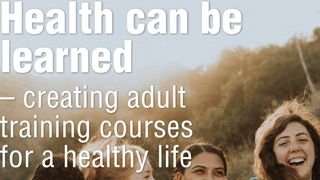
| Short descriptor of good practice |
| The health state of the population is one of the largest challenges of today’s society. Statistics shows that dramatically increases physical and mental illness across different groups of population. The new, innovative training modules will be created for the target groups based on Double HUG model primary developed in Denmark and ABC program primary developed and implemented in Australia. The training modules for adult educators will be provided together with the Double HUG approach and ABC program manual. All the mobilities participants and outputs creators are teachers – adults educators in participating organizations having a long term experience in the training providing. It is envisaged that 170 of participants will be directly affected by the project. As development of the modules for the courses is an ongoing process more persons from the target groups and professionals will benefit applying the products of the project. The project is important not only for project promoters or personal participants, but also to the society they represent, local communities, municipalities and finally on the country and European level. The project activities encourage citizenship and active participation, and stimulates tolerance and awareness of the community including more sustainable development of our society. The core principle of the methodology of carrying out the project is clear management and division of responsibilities amongst partners. The result of the project will be training modules on Health lifestyle learning. It is expected that those courses will improve the quality of training process as well as will be innovative and inclusive for each target group. Project results will be disseminated among other adult learners establishments for usability. The new approach and innovative training will be attractive for target groups and will help by the reducing health inequalities for mentioned above target groups. |
| Type of setting where good practice is delivered |
| NGO / Adult education / Civil Society Non formal education Lifelong Learning |
| Time Frame for delivery of good practice |
| The outcomes four different training module, one general training module, manual could be used as the whole complex or separate by the target group. Project as result provides a comprehensive Health Learning Training module in 4 Languages (English, Danish, Lithuanian and Portuguese) which are accessible to professionals working with the project target group people helping to make a significant and positive impact based on expert best practice. |
| Type of learner the best practice is supporting |
| The project target group not only adult learners but also: 1) Young people with lower education, those with physical, mental and learning disabilities or poor mental health; 2) Persons with reduced activity and mobility due disability; 3) the long-term unemployed persons; 4) the inactive; elderly persons. The another target group – people affected by stress and poor well-being. They are not recognized as vulnerable, but the Project could help them to improve the quality of life. Partners from different regions with different experience in adult education field will work together to implement the project to transfer a new approach to how to improve public health for adult non-formal educators. |
| Resources used as part of good practice |
| Health can be learned – creating adult training courses for a healthy life: https://ec.europa.eu/programmes/erasmus-plus/project-result-content/77210b6e-4a34-43ce-bc0a-aa0bca7ce5d8/Manual_-_English.pdf https://ec.europa.eu/programmes/erasmus-plus/project-result-content/255e19da-a533-4a01-b46b-81d38009cbcf/DOUBLE_HUG_ABC_for_old_people_EN.pdf Training plan: https://ec.europa.eu/programmes/erasmus-plus/project-result-content/e6a9aa1c-0840-4563-91f0-1d59c2c214d8/Training_plan.pdf |
| Aims and objectives of good practice |
| – to provide a valuable training tool for practitioners working with vulnerable individuals within the community to assist them move forward in their personal recovery journey. – the project aims to broaden and promote the skills and knowledge of professionals working with the different target groups about healthy lifestyles and the reduction of health inequalities. – intends to create and test training modules in this area (health education and healthy lifestyles, mental health promotion), based on an innovative approach, already recognized in other countries. Through the training modules to be developed and tested/validated in pilot training, the professionals involved will be able to apply and develop this methodology in each participating country. |
| Evidence as to why this was considered good practice |
| On Erasmus+ project results webpage (https://erasmus-plus.ec.europa.eu/projects/search/details/2019-1-DK01-KA204-060292) this project was selected as example of good practice. |
| 3 Key learning Principles that were used in this good practice to support senior learners |
| 1. Practical Skill Development for Professionals 2. Knowledge Expansion and Health Education 3. Innovative and Adaptive Learning Methodologies |
| Any additional learning that we can take from this good practice example |
| The project focuses on providing a valuable training tool for practitioners working with vulnerable individuals. This highlights the principle of practical skill development, emphasizing the need for professionals to acquire specific, applicable skills that can be directly used in their work. Training that is closely aligned with real-world scenarios enhances the ability of professionals to effectively support individuals in their personal recovery journeys. The project’s aim to create and test training modules based on innovative approaches already successful in other countries reflects the principle of adopting and adapting new learning methodologies. This principle involves exploring and implementing cutting-edge educational strategies that are proven to be effective, thus ensuring that the training remains relevant, engaging, and efficient. The intention to validate these modules in pilot training also underscores a commitment to evidence-based practices and continuous improvement in educational methods. These principles are integral to creating effective training programs that not only enhance the professional capabilities of practitioners but also have a meaningful impact on the communities and individuals they serve. |
| Any Additional Information |
| / |
